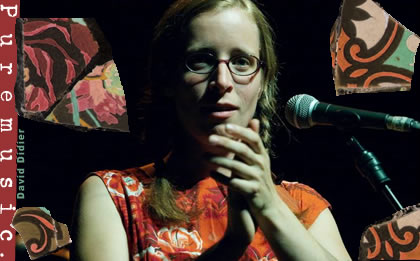
A Conversation with Laura Veirs (continued)
PM: Since he seems very central indeed to the tale, would you tell us something about Pete?
LV: Pete is my partner. I met him in 1994, and we got together in 1995. And he's such a sweet person. He's been an incredible source of support for me over the years, and also a great artistic collaborator in some ways. I would always play him the demos first, and play songs for him, and get kind of a feel for if they were working. And so he's been the first listener for all these songs, and also just a logistic helper for many years when I didn't have a manager. And now I do have a manager, so he's able to take on some of his own interests more now, which is something that we've been trying to open up space for. Because this music stuff can consume you. There's an infinite number of things that a manager type person could do to try to keep the wheels turning, and I think Pete got a little--not "lost" in that, but a little--
PM: Swallowed up.
LV: It was hard on us.
PM: Oh, it'll swallow up everything in the vicinity.
LV: Yeah.
PM: So many good songwriters out there, but very few on a label like Nonesuch. How did that come about, that record deal?
LV: Well, it was this kind of multifaceted thing, where I had gotten a lot of good press in Europe for the last record, Carbon Glacier. And I intentionally did not put it out in the U.S. on my own label--on a tiny label--because I felt like some good label would like it, they just needed to find out about it and hear it. So I saved it. But it had been out for a while in Europe, and it was doing well there. I was getting a buzz there. Then I asked Bill Frisell, "Maybe can you tell me the name of someone to send this to at Nonesuch?" And he said, "Yeah, send it to David Bither, although they really don't sign new people very often."
PM: Right.
LV: And then I sent it to David. He had just gotten back from England where he'd seen a lot of press. And he had known about me previously from Bill, anyway, because Bill played on Trouble by the Fire. And so it was kind of on his radar, but then he got this record from me, and then he had seen the press, and put it all together. He had us fly out to do a show, and we played well at the show, which I was very nervous for, as you can imagine.
PM: Sure.
LV: And they signed us up pretty quickly thereafter, and Carbon Glacier came out here in August, about six months after it came out in Europe. So it turned out great. And then I had to sign with them for the world, which was a little tough, because I was on a great independent label in Europe called Bella Union, and I was good friends with all of them. It was hard to say goodbye to them.
PM: And where are they? I forget. UK?
LV: They're in London.
PM: Yeah, that must have been hard, because they supported you at a really crucial time.
LV: They did, and they were good friends of mine--and they still are. But it was a growing pain. I had to work through it with them, and really debate with myself about whether I wanted to be on this big label for the world, versus multiple small independent labels around the world.
PM: Yeah, that's a very tough question. How did Nonesuch end up doing outside of the States?
LV: They ended up doing well. I was scared because I thought, well, they do have a good rep in the U.S., but I don't know about internationally. But they've helped me sell more records this time in the short period that this album has been out than the whole total of the last one around the world. So that's a step up. It's not crazy sales or anything, but I think they have a pretty good international network through Warner Brothers, which is really who runs the show outside the U.S. Nonesuch acts much more like an independent in the States, but outside of it it's sort of processed through Warner Brothers.
PM: Isn't a large part of your fan base, aside from the NPR crowd, the college demographic?
LV: Yeah. That has been it. And I think that it's not a criticism of Nonesuch, but it's something that people wonder about, whether they can rise to the level of getting the younger crowds interested.
PM: Indeed. Are they good at college radio, basically?
LV: Yeah. Basically, that's the thing. And they're also--yeah, I think they are doing that, and they're working with this group called Girlie Action, which is--
PM: Oh, they're really good. I know them a little bit.
LV: Yeah. And they're doing a great job helping with the younger audience, also helping me with myspace.com page, and just doing stuff that the young kids are into, which is a lot of internet stuff. So I think that it was a good choice.
But it's all an experiment, and it's all in motion, and I'm assessing a lot of the time what's working and what isn't. Luckily I'm not bound to a lifetime contract with them. I like to feel that I still can change gears if I want to and go with different people. But right now I feel committed to working with them. I think they feel the same way about me. continue
print (pdf) listen to clips puremusic home